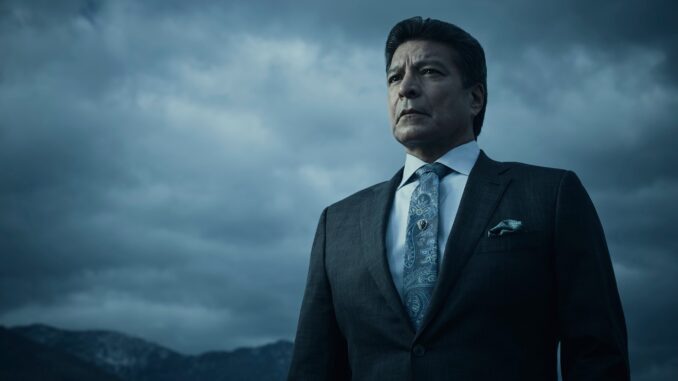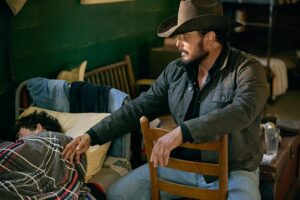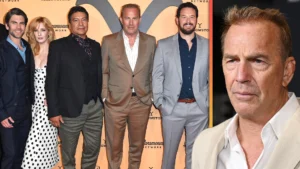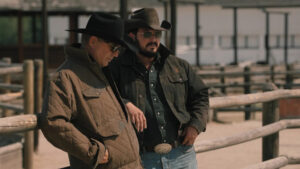
“Yellowstone” has captured the hearts of millions, solidifying its position as America’s most-watched television series. Its widespread popularity can be attributed to a combination of gripping storytelling, unforgettable characters, and its unapologetic portrayal of the rugged beauty and complexities of the modern American West. The show resonates deeply with audiences across demographics, offering a compelling mix of family drama, political intrigue, and timeless themes of loyalty, power, and survival.
At its core, Yellowstone tells the story of the Dutton family, led by the formidable patriarch John Dutton, played masterfully by Kevin Costner. As the owner of the largest contiguous cattle ranch in the United States, John faces constant threats from developers, tribal nations, and even members of his own family. The Duttons’ struggles to maintain their land and legacy serve as the foundation of the show’s narrative, providing a rich tapestry of conflict that keeps viewers on the edge of their seats.

One of the key reasons for the show’s success lies in its ability to blend traditional Western themes with modern storytelling. While Yellowstone draws heavily from the classic Western genre, it reinvents these tropes to reflect contemporary issues. Land disputes, environmental conservation, and corporate greed are central to the plot, making the show feel both timeless and relevant. This balance allows Yellowstone to appeal to a wide audience, from those who grew up watching Westerns to younger viewers intrigued by its fresh take on the genre.
The characters are another significant factor in Yellowstone’s massive appeal. Each member of the Dutton family is deeply flawed yet incredibly compelling. John Dutton’s stoic determination and moral complexity make him a fascinating figure, while Beth Dutton, played by Kelly Reilly, is a force of nature with her sharp wit, unrelenting loyalty, and fierce independence. Kayce, the youngest Dutton son, struggles to balance his love for his family with his desire to forge his own path, providing a relatable and emotional counterpoint to the show’s high-stakes drama. Even the antagonists are multidimensional, with motivations and backstories that add depth to the conflicts.
Beyond its characters, Yellowstone excels in its portrayal of the American West. The breathtaking cinematography showcases Montana’s vast landscapes, making the setting a character in its own right. The sweeping shots of rolling hills, towering mountains, and expansive skies create a visual feast that immerses viewers in the world of the Duttons. This sense of place is crucial to the show’s appeal, evoking both nostalgia for a simpler time and an appreciation for the beauty and harshness of nature.
The series also delves into the socio-political dynamics of the West, exploring the tensions between ranchers, Native American tribes, and land developers. These storylines add depth to the narrative, shedding light on issues such as indigenous rights, land ownership, and the impact of urbanization on rural communities. By addressing these topics, Yellowstone goes beyond being just a family drama or Western; it becomes a commentary on the evolving identity of the American West.

Another reason for the show’s popularity is its creator, Taylor Sheridan, whose vision and storytelling prowess have been instrumental in its success. Sheridan’s writing is both poetic and raw, capturing the complexities of human relationships and the unforgiving nature of life on the frontier. His commitment to authenticity is evident in every aspect of the show, from the realistic portrayal of ranching to the nuanced depiction of political and social issues.
The performances of the cast further elevate Yellowstone to greatness. Kevin Costner brings gravitas and vulnerability to John Dutton, anchoring the series with his commanding presence. Kelly Reilly’s portrayal of Beth is a standout, earning critical acclaim for her ability to convey both strength and fragility. The supporting cast, including Luke Grimes as Kayce, Cole Hauser as Rip Wheeler, and Wes Bentley as Jamie Dutton, deliver equally compelling performances, ensuring that every character feels fully realized and integral to the story.
What sets Yellowstone apart from other television dramas is its ability to evoke a wide range of emotions. The show seamlessly transitions from intense action sequences to moments of quiet introspection, creating a rich emotional landscape that resonates with viewers. Its exploration of themes such as love, betrayal, sacrifice, and redemption ensures that audiences remain deeply invested in the characters and their journeys.

The cultural impact of Yellowstone cannot be overstated. It has revitalized interest in the Western genre and inspired a wave of spin-offs, including 1883 and 1923, which delve into the Dutton family’s history. These expansions of the Yellowstone universe have further cemented its status as a cultural phenomenon, drawing in new viewers and deepening the engagement of existing fans.
In addition to its storytelling and character development, Yellowstone has also sparked conversations about the challenges facing rural America. The show’s depiction of the struggles of ranchers and the clash between tradition and progress resonates with many viewers, particularly those who feel overlooked by mainstream media. This connection to real-world issues gives Yellowstone a sense of authenticity and relevance that few other shows can match.
As Yellowstone continues to dominate the television landscape, its legacy is already being felt. It has redefined what a modern Western can be, proving that the genre is not only alive but thriving. With its compelling characters, stunning visuals, and thought-provoking narratives, Yellowstone has earned its place as America’s most-watched TV show and a cultural touchstone for years to come.
